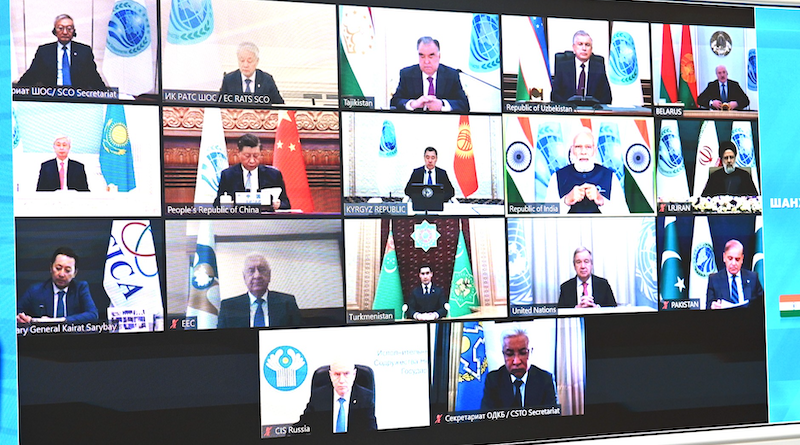India And SCO: Unlocking The Potential In Central Asia – OpEd
India hosted the virtual summit of Shanghai Cooperation Organisation (SCO) this year which would be taken over by Kazakhstan. The theme of SCO under India’s presidency is “SECURE” which stands for Security, Economic development, Connectivity, Unity, Respect for sovereignty and territorial integrity, and environmental protection.
PM Modi lauded the membership of Iran to the organization and shared the screen with Chinese President Xi Jinping, his Russian counterpart Vladimir Putin, Pakistan PM Shehbaz Sharif, and other leaders of the grouping.PM Modi took a firm stand against terrorism and took a dig at Pakistan by calling for “decisive action” against terrorist activities. He also sent a message to China without taking its name against any kind of “double standards” when it comes to combating terrorism. While PM Modi underscored the need to boost connectivity projects, he asserted that it is essential to respect the basic principles of the SCO charter, especially the sovereignty and territorial integrity of member states. India took a resolute stand on this by not signing the paragraph supporting the Belt and Roads Initiative (BRI) led by China.
The Shanghai Cooperation Organisation (SCO), is a regional international organisation that covers 40% of the world’s population and nearly one-third of the global economy. The combined GDP of SCO members is nearly US$20 trillion and more than US$6.6 trillion is traded abroad annually. The main goal of this coalition was to reduce potential border tensions once the Cold War ended.
The “Shanghai Five” group of cooperating nations comprising China, Russia, Kazakhstan, Kyrgyzstan, and Tajikistan, was established in 1996. In addition to Mongolia, Iran, Pakistan, and India joined the SCO as observers in July 2005. India and Pakistan were also admitted as full SCO members in 2017 and then Iran becomes the latest entry to the organisation in the summit of 2023.
The SCO has established itself as a centre for the coordination of particular parts of security and economic policy, and it has grown to become one of several significant voices influencing regional politics and security in Eurasia. The SCO, which encompasses a significant area in and around Central Asia, a sizable portion of the global population, energy resources, nuclear weapons, and sizable armed forces, in principle offers a strong potential for economic, political, and military cooperation in the region. Russia and China now dominate the political and economic spheres while the United States and Europe sit on the edge, seeking opportunities for greater political and economic involvement in the Central Asian region.
Given their apprehensions about Russia and their suspicion of China, the CARs have attempted to strike a compromise between retaining strategic autonomy and maximizing political and economic gains from each actor through their membership in SCO. The big powers control maximum trade and market in Central Asia and therefore leave little space for India to set up its footsteps there. Central Asian republics also seek India’s cooperation in the fields of education, health, technology trade, and industrial joint ventures, but the lack of transportation and involvement of major powers is the main hurdle.
India can strengthen multilateral engagement with its Central Asian partners through SCO by exploring synergies with other regional and extra regional to promote security, stability, growth, and economic development for all nations. There is space for India-Russia and China cooperation to promote economic, trade, education, culture, and science and technology in Central Asia without undermining each other’s sensitivities.
India and China can collaborate in combined resource development, production, and delivery projects in Central Asia, both on a diplomatic and financial level. A security framework of cooperation promoted by and involving India and China would allow for a sustainable evolution of different parts of the rapidly developing and developed Asia. India can strengthen its strategic bilateral partnership with the CARs by advancing greater security cooperation with Russia by building on its close ties with Moscow in the Central Asian region.
Both Pakistan and India individually pursue distinct initiatives aimed at enhancing their respective ties with Central Asia. India is keen to develop the port of Chabahar in south Iran boosting trade through Afghanistan. Pakistan aspires to work with Kabul and Tashkent on the new Trans-Afghan railway that will connect Uzbekistan with Pakistani ports. In order to to meet Central Asia’s interest for critical water routes and trade, Central Asian republics have incentives to further their integration with Delhi and Islamabad. They also want to have greater access to each nation’s warm-water ports for trade and commerce.
Iran will emerge as a key participant in the grand game in Central Asia as it gets the status of a full member of SCO. Iran is vital to India because it provides access to Central Asian and Caspian oil resources. In the absence of a direct route via Pakistan, it is Iran that connects India to Afghanistan, Central Asia, and Russia. India’s engagement with Central Asia necessitates a cooperative and collaborative approach where India should identify common needs and push for joint efforts by member states of SCO.

